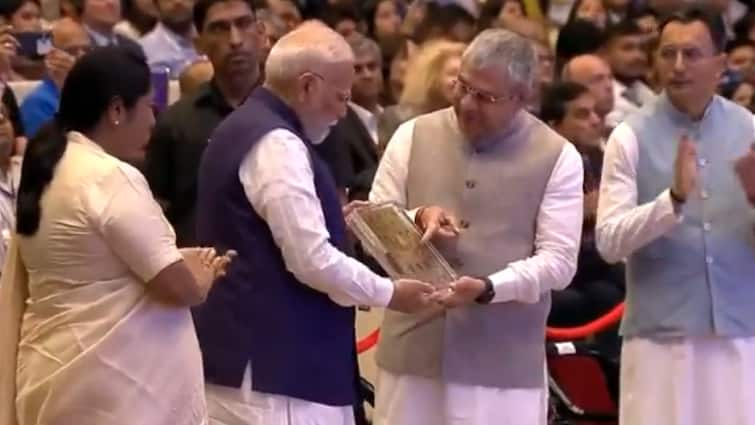At SEMICON India 2025, Union Minister for Electronics and IT, Ashwini Vaishnaw, showcased a breakthrough in India’s SEMICONductor journey — the Vikram 32-bit microprocessor. Prime Minister Narendra Modi was presented with the processor along with test chips from four government-approved projects, marking a defining step in India’s push for Semiconductor self-reliance.
The Vikram 3201, developed jointly by the Indian Space Research Organisation (ISRO) and the Semi-Conductor Laboratory (SCL), is the first indigenously built 32-bit processor qualified for use in the punishing environment of launch vehicles. The chip is designed to withstand extreme temperatures, from -55°C to +125°C, and ensures reliability in navigation and control functions during space missions.
#WATCH | At Semicon India 2025, Union Minister for Electronics & Information Technology, Ashwini Vaishnaw presents Vikram 32-bit processor and test chips of the 4 approved projects to PM Narendra Modi.
Vikram 32-bit processor is the first fully “Make-in-India” 32-bit… pic.twitter.com/8FCkbe0sve
— ANI (@ANI) September 2, 2025
From 16-bit Legacy To 32-bit Innovation
The Vikram 3201 is a natural progression from the VIKRAM1601 microprocessor, which has powered ISRO’s launch vehicles since 2009. While the earlier chip was a 16-bit design, the new processor steps up with a 32-bit general-purpose architecture. It supports 64-bit floating-point operations, Ada language compatibility, and comes integrated with on-chip 1553B bus interfaces.
Fabricated using SCL’s 180nm CMOS technology, the device demonstrates India’s growing capability to produce space-grade microelectronics entirely in-house.
Back on March 5, the first production batches of the Vikram 3201 and another processor, Kalpana 3201, were formally handed over to ISRO Chairman Dr. V. Narayanan by MeitY Secretary S. Krishnan. The ceremony, held in New Delhi, also saw the participation of Dr. Unnikrishnan Nair, Director of Vikram Sarabhai Space Centre, alongside the SCL design teams.
Ready For Missions
The Vikram 3201 has already proven its mettle in orbit. Its initial lot was successfully validated in the PSLV-C60 mission, where it powered the Mission Management Computer of the PSLV Orbital Experimental Module (POEM-4). In addition to the processor, four other indigenously developed devices aimed at miniaturising launch vehicle avionics were also handed over.
These included two variants of a Reconfigurable Data Acquisition System, a Relay Driver IC, and a Multi-Channel Low Drop-out Regulator IC.
Atmanirbharata In Semiconductors
As mentioned earlier, alongside Vikram 3201, the Kalpana 3201, a 32-bit SPARC V8 RISC microprocessor, was also introduced. Designed with compatibility for open-source toolsets, it underscores India’s widening SEMICONductor ecosystem.
All supporting software tools for Vikram 3201, including compilers, assemblers, linkers, simulators, and integrated development environments, have been built indigenously by ISRO. A C language compiler is also in the works to expand flexibility. This in-house ecosystem is a first for India and marks a significant stride toward Atmanirbharata in critical SEMICONductor technology.
With this achievement, India has cemented its position among nations capable of developing high-reliability processors for space applications, a leap that promises long-term benefits for both national security and advanced technology industries.



